The governing party went on the offensive against an opposition bill which would enshrine the "one China" principle as part of Taiwanese law and would establish a partisan committee to conduct relations with China, effectively cutting out the executive branch from cross-strait relations.
Democratic Progressive Party (DPP) Chairman Su Tseng-chang (
Su made the remarks after violent battles in the Legislative Yuan yesterday over the proposed national communications commission (NCC) bill, which is designed to set up a media watchdog agency.
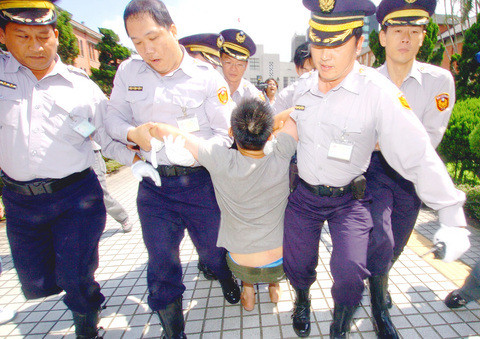
PHOTO: LO TEH-PEI, TAIPEI TIMES
Su said that the pan-blue camp's leaders had neglected the nation's outcry against China's "Anti-Secession" Law, which Beijing passed in March.
The visits to China by these pan-blue camp leaders helped China to relieve international pressure and denunciation from the international community following the enactment of the Anti-Secession Law, Su said.
Half a year later, the pan-blue camp is proposing the cross-strait peace advancement bill, which echoes the Anti-Secession Law, Su said. He added that if the law was passed, it would definitely undermine the peace in the Taiwan Strait and endanger Taiwan's sovereignty and democracy.
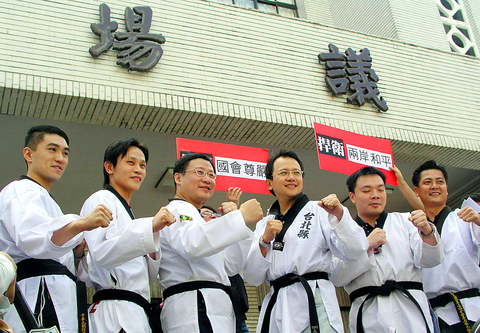
PHOTO: CNA
"Therefore, the DPP has to show our stern opposition to the [peace advancement] bill using three points on behalf of 23 million people of Taiwan," Su said, speaking before the party's weekly central standing committee meeting yesterday afternoon.
First, the pan-blue camp's bill is a "surrender bill," because it attempts to legalize the "one China" principle and the so-called "1992 consensus," turning them into domestic law, which would blur the government's legitimacy and negate Taiwan's sovereignty, Su said.
Second, if the bill is passed, any statement or action that opposes the "one China" principle will become illegal, thus restricting the hard-earned freedom of the people of Taiwan.
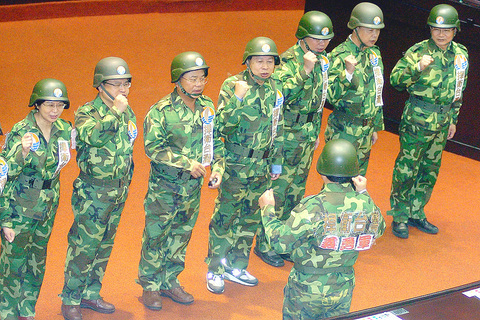
PHOTO: LIAO CHENG-HUI, TAIPEI TIMES
Third, if the pan-blue camp does take advantage of its majority and forces passage of the bill, then the president's power to conduct national defense and diplomacy will be usurped, thus sabotaging the constitutional system, Su said.
"The DPP will try to stop the pan-blue camp from exploiting its majority to attain its endless political blackmail of the people of Taiwan," Su said.
Su also blasted the proposed NCC bill.
"The pan-blue camp ignores the fact that the NCC committee members are supposed to be neutral and independent, and they are insisting that committee members should be appointed according to the seats in each political party," Su said.
"It will introduce political confrontation into an independent organization, and thus political parties will be able to control the mass media," Su said. "If this happens, the reform of the mass media will never succeed."

Greenpeace yesterday said that it is to appeal a decision last month by the Taipei High Administrative Court to dismiss its 2021 lawsuit against the Ministry of Economic Affairs over “loose” regulations governing major corporate electricity consumers. The climate-related lawsuit — the first of its kind in Taiwan — sought to require the government to enforce higher green energy thresholds on major corporations to reduce emissions in light of climate change and an uptick in extreme weather. The suit, filed by Greenpeace East Asia, the Environmental Jurists Association and four individual plaintiffs, was dismissed on May 8 following four years of litigation. The

STAY AWAY: An official said people should avoid disturbing snakes, as most do not actively attack humans, but would react defensively if threatened Taitung County authorities yesterday urged the public to stay vigilant and avoid disturbing snakes in the wild, following five reported snakebite cases in the county so far this year. Taitung County Fire Department secretary Lin Chien-cheng (林建誠) said two of the cases were in Donghe Township (東河) and involved the Taiwan habus, one person was bit by a Chinese pit viper near the South Link Railway and the remaining two were caused by unidentified snakes. He advised residents near fields to be cautious of snakes hiding in shady indoor areas, especially when entering or leaving their homes at night. In case of a
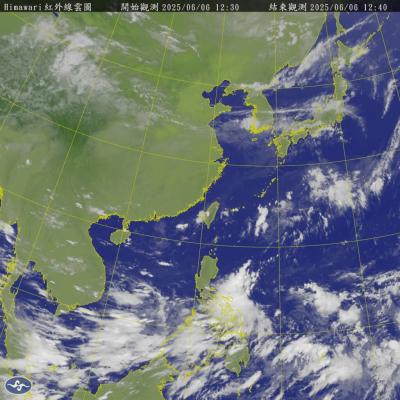
A tropical disturbance off the southeastern coast of the Philippines might become the first typhoon of the western Pacific typhoon season, the Central Weather Administration (CWA) said. The system lacks a visible center and how it would develop is only likely to become clear on Sunday or Monday, the CWA said, adding that it was not yet possible to forecast the potential typhoon's effect on Taiwan. The American Meteorological Society defines a tropical disturbance as a system made up of showers and thunderstorms that lasts for at least 24 hours and does not have closed wind circulation.
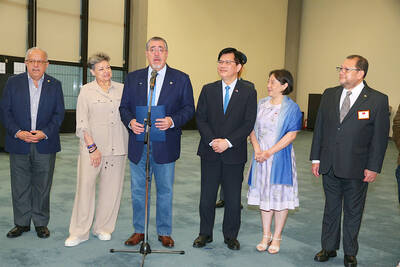
DIPLOMACY: It is Guatemalan President Bernardo Arevalo’s first visit to Taiwan since he took office last year, while Eswatini’s foreign minister is also paying a visit A delegation led by Guatemalan President Bernardo Arevalo arrived in Taiwan yesterday afternoon and is to visit President William Lai (賴清德) today. The delegation arrived at Taiwan Taoyuan International Airport at 4:55pm, and was greeted by Minister of Foreign Affairs Lin Chia-lung (林佳龍). It is Arevalo’s first trip to Taiwan since he took office last year, and following the visit, he is to travel to Japan to celebrate the 90th anniversary of diplomatic relations between the two countries. Arevalo said at the airport that he is very glad to make the visit to Taiwan, adding that he brings an important message of responsibility